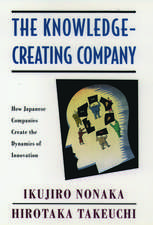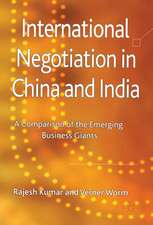India's Late, Late Industrial Revolution: Democratizing Entrepreneurship
Autor Sumit K. Majumdaren Limba Engleză Paperback – 23 mai 2012
| Toate formatele și edițiile | Preț | Express |
|---|---|---|
| Paperback (1) | 330.77 lei 6-8 săpt. | |
| Cambridge University Press – 23 mai 2012 | 330.77 lei 6-8 săpt. | |
| Hardback (1) | 466.18 lei 6-8 săpt. | |
| Cambridge University Press – 23 mai 2012 | 466.18 lei 6-8 săpt. |
Preț: 330.77 lei
Nou
Puncte Express: 496
Preț estimativ în valută:
63.30€ • 65.84$ • 52.26£
63.30€ • 65.84$ • 52.26£
Carte tipărită la comandă
Livrare economică 14-28 aprilie
Preluare comenzi: 021 569.72.76
Specificații
ISBN-13: 9781107622869
ISBN-10: 1107622867
Pagini: 452
Ilustrații: 32 b/w illus. 44 tables
Dimensiuni: 152 x 228 x 20 mm
Greutate: 0.73 kg
Ediția:New.
Editura: Cambridge University Press
Colecția Cambridge University Press
Locul publicării:New York, United States
ISBN-10: 1107622867
Pagini: 452
Ilustrații: 32 b/w illus. 44 tables
Dimensiuni: 152 x 228 x 20 mm
Greutate: 0.73 kg
Ediția:New.
Editura: Cambridge University Press
Colecția Cambridge University Press
Locul publicării:New York, United States
Cuprins
List of figures; List of tables; Acknowledgements; Preface: The Maharaj and the Saffron; 1. Vent for growth; 2. Industrial revolutions; 3. Aspects of Indian enterprise history; 4. Emergence of modern industry; 5. Asian late industrialization; 6. Democratizing entrepreneurship; 7. Contemporary India; 8. The services sector debate; 9. A paean for manufacturing; 10. Reindustrializing India; Appendices; Notes; References; Index.
Recenzii
'This important book highlights the key role that entrepreneurship has played in generating India's rapid economic development. [It] provides a thoughtful and insightful analysis that opens new territory to scholars and policy makers not just in economic development but also entrepreneurship.' David Audretsch, Director, Institute for Development Strategies, Indiana University
'In the spate of literature that is being published on India's economic growth, Sumit Majumdar's book can claim several special distinctions. First, it squarely focuses its attention on entrepreneurship, a central element in any capitalist growth story. Second, he does not take the side of those who regard all earlier state action as only inhibiting India's growth. Majumdar also does not blink in recognizing that the business practices of many entrepreneurs could be quite dubious, but for him that is an essential part of capitalist growth. I hope that both proponents and opponents of economic liberalization will read this book.' Amiya Bagchi, Institute of Development Studies, Kolkata
'The Indian economy has been the subject of splendid books which have shown how the Indian economic policy framework doomed India to lacklustre performance and how the post-1991 reforms finally liberated India into the last two decades of accelerated growth and attendant impact on poverty. One might think that nothing could be added. Yet, Sumit Majumdar has written a superb book that breaks new ground and offers many new insights. And he writes gloriously. His book will become a classic.' Jagdish Bhagwati, University Professor, Economics and Law, Columbia University
'Professor Majumdar's book comes when the Government of India is framing a new policy, stressing the importance of accelerating manufacturing activity. The author has come to the same conclusion, with the backing of an enormous amount of well researched data. Very timely and well worth reading.' R. C. Bhargava, Chairman, Maruti Suzuki
'Within the book is a masterly blend of history, contemporary facts, moral tales, theory, statistics and analysis that provides a compact view of everything that you ever wanted to know about Indian industry, but were too unsure to ask. The comparative assessment of India's performance, relative to other countries, is an important portion of the book that ought to be read by all those interested in India's economic growth.' A. M. Naik, Chairman and Managing Director, Larsen and Toubro, India
'The improvement in India's economic performance over the past twenty years is one of the great successes of globalisation. By providing the historical background to these events as well as a detailed analysis of India's current achievements and challenges, this book sheds valuable light on one of the most important economic developments of our time.' Geoffrey Owen, London School of Economics
'With an engaging mixture of anecdote and analysis, Sumit Majumdar identifies the democratised entrepreneurship that is at the heart of India's current economic revolution, and expounds and explains the historical context in which this has occurred. This important book should encourage Indians from all backgrounds to transform their lives.' B. R. (Tom) Tomlinson, Professor Emeritus, SOAS, University of London
'This fine, well-researched book deploys economic history and economic analysis to lay out what it considers the elements of India's industrial revolution.' Rahul Mukherji, Pacific Affairs
'In the spate of literature that is being published on India's economic growth, Sumit Majumdar's book can claim several special distinctions. First, it squarely focuses its attention on entrepreneurship, a central element in any capitalist growth story. Second, he does not take the side of those who regard all earlier state action as only inhibiting India's growth. Majumdar also does not blink in recognizing that the business practices of many entrepreneurs could be quite dubious, but for him that is an essential part of capitalist growth. I hope that both proponents and opponents of economic liberalization will read this book.' Amiya Bagchi, Institute of Development Studies, Kolkata
'The Indian economy has been the subject of splendid books which have shown how the Indian economic policy framework doomed India to lacklustre performance and how the post-1991 reforms finally liberated India into the last two decades of accelerated growth and attendant impact on poverty. One might think that nothing could be added. Yet, Sumit Majumdar has written a superb book that breaks new ground and offers many new insights. And he writes gloriously. His book will become a classic.' Jagdish Bhagwati, University Professor, Economics and Law, Columbia University
'Professor Majumdar's book comes when the Government of India is framing a new policy, stressing the importance of accelerating manufacturing activity. The author has come to the same conclusion, with the backing of an enormous amount of well researched data. Very timely and well worth reading.' R. C. Bhargava, Chairman, Maruti Suzuki
'Within the book is a masterly blend of history, contemporary facts, moral tales, theory, statistics and analysis that provides a compact view of everything that you ever wanted to know about Indian industry, but were too unsure to ask. The comparative assessment of India's performance, relative to other countries, is an important portion of the book that ought to be read by all those interested in India's economic growth.' A. M. Naik, Chairman and Managing Director, Larsen and Toubro, India
'The improvement in India's economic performance over the past twenty years is one of the great successes of globalisation. By providing the historical background to these events as well as a detailed analysis of India's current achievements and challenges, this book sheds valuable light on one of the most important economic developments of our time.' Geoffrey Owen, London School of Economics
'With an engaging mixture of anecdote and analysis, Sumit Majumdar identifies the democratised entrepreneurship that is at the heart of India's current economic revolution, and expounds and explains the historical context in which this has occurred. This important book should encourage Indians from all backgrounds to transform their lives.' B. R. (Tom) Tomlinson, Professor Emeritus, SOAS, University of London
'This fine, well-researched book deploys economic history and economic analysis to lay out what it considers the elements of India's industrial revolution.' Rahul Mukherji, Pacific Affairs
Notă biografică
Descriere
Catalogues and explains India's late, late industrial revolution through a combination of rigorous analysis and entertaining anecdotes.









